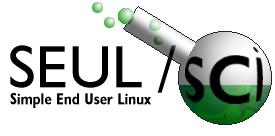
 |
Linux in Science Report #6 |
|---|
| Previous Report | Reports Page | Next Report |
|---|
|
01 Jan 2001--
After a rather long respite to deal with my dissertation and work, the series of Linux in Science reports is resuming, albeit at a (hopefully) fortnightly rate.
Recently, I've taken a position as a network administrator for a local tech company. Although this isn't directly related to science, there are some really interesting insights that have come out of it. Some background: the internal net uses Linux to provide internal services to a Win32-based network. Although I tend to spend at most 10-20% of work time on the servers, I find it very ironic that supporting the workstations that tends to consume most work time. The issues tend to revolve around three general themes: user issues ('my foo won't work' or 'the network doesn't work'), standards issues (getting different-language versions of the same software to work properly together - accented text and other issues relating to i18n text, or my favourite, getting different-language versions of Outlook to play nicely together), and finally machine issues, ether updates or actual workstation rebuilding (which I do everytime a machine is alloted to a different user). Interestingly, looking at this in lab or departmental context, the open source approach allows quite a bit of flexibility to resolve these three general issues. First, although user education is particularly important, few institutions can commit the resources to ensure that new users obtain the information they require. That said, putting relevant information online locally (perhaps as web pages) is a great way to habituate users to searching for info when they have questions. The irony I find in many academic and research organizations is the realization that although one of our greatest tasks is to contribute to the written knowledge base (academic journals and the like), much of our day to day knowledge is passed on in the oral tradition. This has the unfortunate tendency of allowing labs to lose significant practical know-how when post-docs leave or when students graduate. I'm curious to know how others are dealing with this problem, and as this volume of information grows over time, how the info is maintained to ensure its utility. I should also mention that in addition to information pertaining to scientific software, I would be very interested to learn about projects, papers or other documents which have relied on Linux as the primary research platform Here are some more links and updates for some scientific software that we've found...
Chemsuite - http://chemsuite.seul.org/
Hello Folks,
Grace - http://plasma-gate.weizmann.ac.il/Grace/
SciGraphica - http://scigraphica.sourceforge.net/
FREEGIS - http://freegis.org/
You might consider linking to the freegis.org project, which basically tries to be a portal for free software (as in the FSF sence) and Geographic Information Systems (GIS). Thanks to everyone who emailed me about these and other apps. I look forward to reading about useful scientific applications for Linux, and especially HOW this software is being used. -- Pete St. Onge (pete@seul.org) |
| Previous Report | Reports Page | Next Report |
|---|
| Please report any technical problems to webmaster@seul.org. |